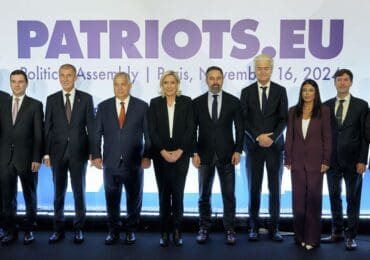In a controversial video recently released by The Middle East Media Research Institute (MEMRI), American Imam Tom Facchine made audacious claims about Sharia law, asserting that it is the best system of law the world has ever seen. Facchine argues that Sharia law is merciful and focuses on redeeming individuals, claiming it is superior to the current legal systems. However, an objective analysis of Sharia law reveals a complex and often controversial set of principles that raises significant concerns about human rights, religious freedom, and equality of treatment based on faith and race.
Sharia
Sharia law, the Islamic legal system derived from the Qur’an and Hadith, has long been a subject of intense debate and controversy. Proponents, mainly Muslims and their Communist supporters, argue that it is a comprehensive and just system that provides guidance for Muslims in all aspects of life. However, critics point to its corporal and even deadly punishments, discriminatory practices, and infringement on fundamental human rights.
Sharia Law: A Divine Mandate or a Man-Made System?
Sharia law is often hailed as “Allah’s Law” by its proponents, who assert that it is an immutable divine mandate. However, it is crucial to recognize that Sharia law, as we know it today, was codified several centuries after the time of Muhammad. It is influenced by the interpretation of Islamic scholars and the historical context in which it evolved. Moreover, there are multiple schools of thought within Islam, each with its own version of Sharia, leading to variations in its application and understanding. But all of them use harsh corporal punishments such as amputations and even lethal ones such as stoning. And as in communist societies, there is also no presumption of innocence.
Freedom of Conscience and the Suppression of Dissent
One of the most contentious aspects of Sharia law is its approach to freedom of conscience and the free exchange of ideas. Apostasy, the act of renouncing Islam, is considered a grave offense punishable by death, according to Sharia (o8.1). This draconian stance violates the fundamental human right to religious freedom, stifles intellectual inquiry, and fosters an environment of fear and conformity.
Jihad: Holy War or Peaceful Struggle?
The concept of jihad is often misunderstood and misrepresented. While proponents argue that it signifies a spiritual struggle for self-improvement, the reality is that it encompasses the obligation to wage war against non-Muslims until they either convert to Islam or submit to Muslim rule, which means paying a special tax (jizya) (o9.8, o9.7) and live as a second class citizen with little to no rights. The third choice is death. This expansionist interpretation of jihad poses a significant challenge to religious pluralism, coexistence, and the principles of equality and tolerance.
Discrimination and Subjugation of Women
Sharia law has long been criticized for its treatment of women, which is marked by gender inequality and the erosion of basic rights. Women’s autonomy and agency are severely restricted in matters such as marriage, divorce, custody of children, and freedom of movement. The requirement of male guardianship (m3.4-m3.8) undermines women’s ability to make independent decisions and perpetuates a system that views them as subordinate to men.
Permissible Lying and Deception
The concept of taqiyya, or permissible lying, is often used to justify deception in specific circumstances, such as settling disputes or protecting oneself or the Muslim community. While proponents argue that it is a pragmatic measure to ensure safety, critics view it as a tool for manipulation and dishonesty. The ethical implications of such a doctrine raise concerns about trust and the integrity of individuals and communities.
Non-Muslims: Second-Class Citizens?
Sharia law’s treatment of non-Muslims raises significant concerns regarding religious freedom and equality. It designates them as dhimmis, imposing a poll tax (jizya) on them and subjecting them to various restrictions and humiliations (o9.9, o11.0-11). This unequal treatment fosters a climate of discrimination and intolerance, hindering social cohesion and perpetuating divisions within society.
Slavery: A Troubling Legacy
While the issue of slavery has been widely condemned and abolished across the world, Sharia explicitly addresses and codifies its practice. Though modern interpretations of Sharia may downplay or omit these rules publicly, it cannot be denied that its historical and foundational texts contain provisions that legitimize and regulate slavery. In the Islamic Republic of Mauritania, slavery is still openly a central part of their society, although they claimed to have ended it in 1981; as of 2018, Mauritania has an estimated 90,000 actual slaves.
While Imam Tom Facchine claims that Sharia law embodies mercy and redemption, a closer examination reveals its impact on human rights, gender equality, and religious freedom. The selective portrayal of Sharia by some proponents in the West often downplays its violent and discriminatory aspects, leading to dissenters being labeled as religious bigots. Muslims cunningly employ this insidious strategy to systematically normalize and mislead unsuspecting Westerners, cloaking the truly alarming and perilous nature of Sharia law.














😆Iman Taquiya Tom = 💩🤡
I have seen turkeys with a better beard than Tom. I had a turkey named Club Sandwich, and his beard was almost 6″ long. He weighed at least 40 lbs. Took two weeks to eat him.
“Pentagon Defends LGBTQ Priorities”
AND USA NOW HAS A SHIT ARMY, TOO, WITH ONLY LGBTQ SHIT SOLDIERS.
Watch the video:
https://rumble.com/v2s0gp8-plandemic-3-the-great-awakening-full-unedited-movie.html
SCHWAB, HARARI, BIDEN, TRUDEAU, VON DER LEYEN, MACRON, MARIN, ARDERN, SCHOLZ, SOROS, GATES, ZUCKERBERG, etc ARE THE REAL SATANS!
Religions are not all equal.
One calls on its followers to kill those who were in its ranks but now call out its teachings as false while another says that God alone should be left to judge and punish.
One advocates for cutting off the hand of a thief while another directs their followers: “Let the thief no longer steal, but rather let him labour, doing honest work with his own hands, so that he may have something to share with anyone in need.”
Judge which of these two is deceiving its followers and follow the other.